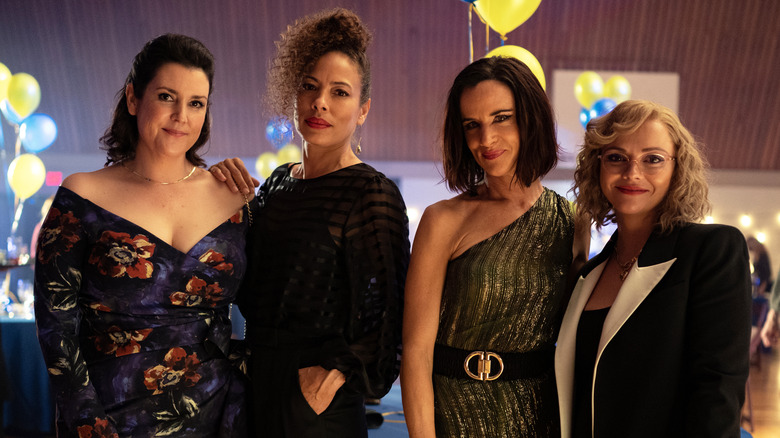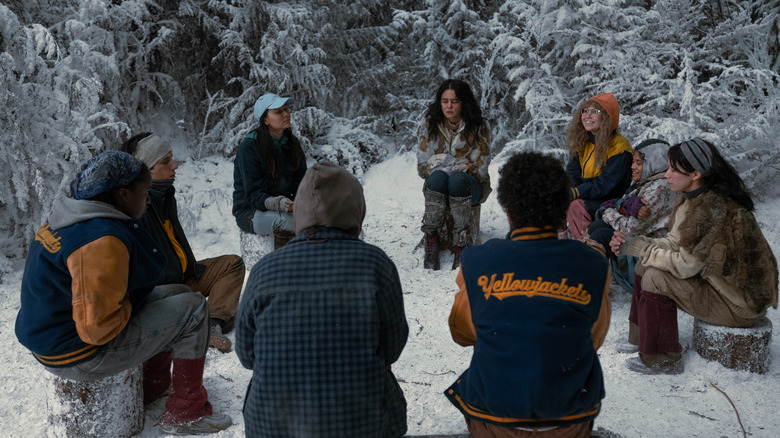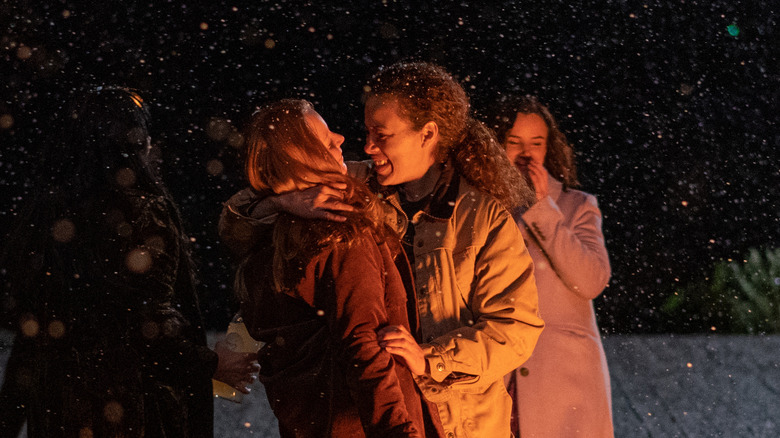How Yellowjackets Built One Of The Most Passionate Fanbases In Modern TV
At first blush, Showtime's hit series "Yellowjackets" seems like a natural fit for the modern TV landscape. It has a lot of the hallmarks that have made many other successes successful: a well-calibrated mix of established actors (Melanie Lynskey, Juliette Lewis) and exciting new talents (Sophie Thatcher, Liv Hewson) lining the cast, a thematic preoccupation with trauma and the tricks of memory, muddy lighting design, a needle drop approach to music and a jukebox soundtrack, and more still.
But now that we've reached the dramatic second season finale, I can't help but linger on all the ways that its success is so atypical. In the sense that I'm using "success" and "successful," I'm not referring to viewership numbers (which are good) or critical opinion (which is also good, just visit slashfilm dot com any Thursday evening after new episodes premiere to see for yourself). I'm talking about fan reception. Specifically, the cultivation of one of the most active, rabid, engaged, and fiercely loyal fanbases in modern television, rivaled perhaps only by "Succession," but that's only a few days longer for this world.
The question of how "Yellowjackets" managed to amass such a uniquely intense fanbase can actually be answered by the particular ways in which the show diverges from the prestige template that's had TV in a vice-grip since "Mad Men." And the best way to illuminate that connection is not to explore what the showrunners, Showtime, and the marketing team do to court that fanbase, but what it is about the show, formally and aesthetically, that no one else is doing.
The story and the storyteller
"Yellowjackets" is a lot of things. It's a show about survival, a dark comedy, a coming-of-age story, and a performance showcase. If you had to fit it into a broad category of series formats that work in today's TV ecosystem, though, you'd call it a mystery. That's the way "Yellowjackets" first hooked its audience, by asking a series of huge questions in the pilot that would slowly be answered over the course of the show.
In fact, most of the intrigue that "Yellowjackets" is still riding on was generated by a single question posed in a single scene: the pilot's cold open. Watching a band of feral, fur-clad warrior girls chase one of their own through the forest and into a spike-filled pit at the behest of some kind of antler queen begged the question: how did these normal suburban teenagers come to this?
The spellbinding visual contrast between the clean, polite, ordinary girls we meet soon after and the avatars of savagery and chaos that we're first introduced to continues to be the series' main source of power. A frictive charge that energizes each scene with a pull forward: you have to keep watching to find how that gap gets bridged.
So, Ashley Lyle, Bart Nickerson, Karyn Kusama, and the rest of the creative team landed on a great mystery that viewers feel compelled to solve. Is that the reason why the show has produced more podcasts, Reddit threads, fan blogs, Twitch discussions, and video essays than virtually any other show on the air? Don't dozens of shows with the same mystery core design debut to strong ratings and reviews yet nevertheless fail to find an audience?
The key to its ability to rise above the rest, I think, lies not in what kind of story "Yellowjackets" is telling, but in who's telling that story, and to whom they're telling it.
Never was a cornflake girl
When I say "prestige TV," what comes to mind? "Mad Men," Breaking Bad," The Sopranos," "Succession," "Barry," "The Wire," "True Detective" — there's a pattern here, I'm sure you can see, and I'm far from the first person to point it out. "Serious" television is extraordinarily male-dominated. The problem is way more expansive than these shows having heavily male casts. In the preoccupation with strenuous themes like crime and capitalism, in the austere aesthetics, the choked emotional range, and the reflex toward narrative dissolution over catharsis: these shows are masculine in form. "Yellowjackets" is entirely for the girls.
You probably thought of some other so-called "prestige" titles that buck the macho trend, like "Big Little Lies," "The Handmaid's Tale," or "Mare of Easttown." But "Yellowjackets" still stands apart. Even though half the show tracks the lives of a series of adult women whose rough edges and repressed traumas will be mightily familiar to the prestige enjoyer, the heart and soul of "Yellowjackets" lies with its teen cast, and I'd argue that it takes its formal cues from them.
"Yellowjackets" has a caustic emotional tone. It's unsettled, uneven, prone to dramatic flare-ups and long, lingering bouts of melancholy. It never, ever takes itself too seriously, conforming to the buttoned-up, greyscale emotionalism we're accustomed to on prestige TV only in select moments where it's appropriate. It's also utterly, unashamedly earnest. The fandom "Yellowjackets" has inspired act more like Swifties than "Succession"-heads: creating charts, baking cakes, and making so, so many Tumblr edits. The teen and under-25 demographic is the most consistently underestimated, condescended to, and dismissed demographic there is. Yet again and again, they prove their brilliance, their devotion, and their utterly idiosyncratic modes of engagement around flashpoints from "Twilight" to Tori Amos.
In Amos' famous formulation that there are two types of girls out there, cornflake girls and raisin girls, who hate other women and love other women, respectively, "Yellowjackets" succeeds because it is through and through a raisin girl.


